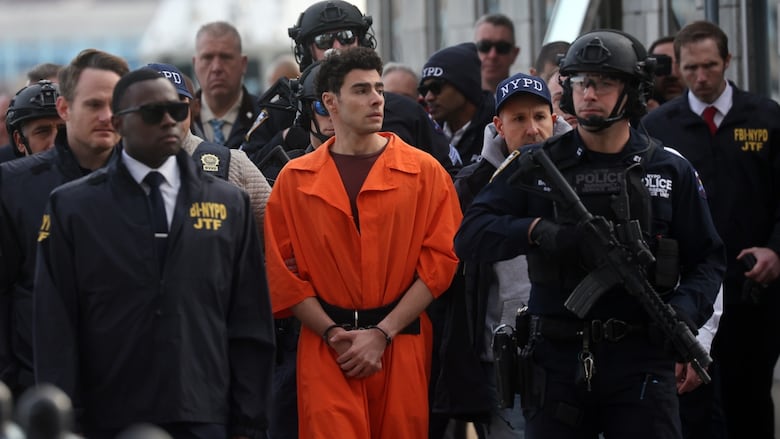Is it too soon for a musical about Luigi Mangione?
Arts reporters Joshua Chong and Jim Provenzano discuss the musical about the alleged CEO killer

When Luigi Mangione was arrested on suspicion of murdering the UnitedHealthcare CEO Brian Thompson, he quickly became a fixture in the minds of many on the internet and around the world.
Just six months after Mangione's arrest, a company in San Francisco created a musical about him, Luigi: The Musical, that has been playing to sold-out crowds.
Luigi: The Musical is a fictional reimagining of Mangione's time in prison (which he is still in as he awaits his trial), including interactions with rapper Sean "Diddy" Combs and crypto company founder Sam Bankman-Fried.
Today on Commotion, host Elamin Abdelmahmoud chats with Toronto Star arts critic Joshua Chong and Bay Area Reporter arts editor Jim Provenzano about how this show came to be and where it fits in the history of musicals responding to current events.
We've included some highlights below, edited for length and clarity. For the full discussion, listen and follow Commotion with Elamin Abdelmahmoud on your favourite podcast player.
Elamin: Jim, if this is a work of satirism, poking fun at these systems that shape our lives, is [the musical] successful? Does it work as a satire when you see it?
Jim: I think it worked as what they wanted to do. One [San Francisco] Chronicle reviewer was comparing it to the best of the theatre in the Bay Area, like Berkeley Repertory or American Conservatory Theater. You can't do that. You can compare it to, say, our local nightclub, OASIS, which does hilarious drag parodies of shows, of movies like Jurassic Park, which is currently running, even Dracula and other thematically pop trendy things. And they succeeded in that. It's a bare bones production, but the audiences just love it. And I'm not one for status quo or "let the masses have what they want." But it was clever, and they hit the mark.
I think one phrase that stuck in my head [when] considering this show is: comedy is someone else's tragedy plus time and distance. And the thing that the negative critics have said about this is that there hasn't been enough time for people to process it. It's still ongoing, but the whole arrest and arraignment of Luigi Mangione was performative theatre in itself.
Elamin: Yeah, I think that the ways that those images played in the press over and over again. You saw very detailed analysis of his haircuts …. It really was a very theatrical thing that played out.
I'll tell you what draws my attention to the story [of Luigi: The Musical]. It's using a kernel of the truth, a real thing that is happening, or did happen, which is that Diddy and Luigi and Sam Bankman-Fried, they were all incarcerated in the same facility in New York while awaiting various different trials.
And Josh, we've talked before about the idea of adapting something that is happening in the news to the big screen, the idea that that can happen a little bit quickly. The idea that this, first of all, comes out during the Diddy trial, which is quite fascinating in terms of timing, but also ahead of Luigi's trial. The Luigi trial has not happened yet. Have we seen something like this before?
Joshua: We have. And I think it's happening more recently. Look back in history, for example, the musical Chicago, it's based on real events. This journalist, who covered the trials of these women who allegedly murdered their husband and got off with it, she turned it into, I believe, a play at first, and then it was adapted into the musical that we now know as Chicago. But that took decades, right? It was decades.
Elamin: The play was 1926. It took 50 years to get to the musical.
Joshua: Same with Come From Away, right? 9/11. On the 10th anniversary, the Canadian writers went to Gander, interviewed the subjects, and then five years later, about 2016 — about 15 years after 9/11 — did Come From Away premiere.
But we're starting to see things start to shift and musicals being a bit more reactive now. This musical, Luigi, isn't the first. Just last year at the Edinburgh Fringe Festival, there were two shows about Gwyneth Paltrow's ski trial — two of them, and they made international headlines. One of them was so successful that it transferred to the West End.
So I think what we're seeing is composers and writers trying to capitalize on the cultural zeitgeist. I think the thinking in the past was that: no, there needed to be this time for people to reflect, and on playwrights to reflect and digest all of this before turning it into a theatrical work. And that we'd leave it for other mediums, like Saturday Night Live, to offer that instant reaction. But I think now musical theatre writers, such as the creators of this musical and the two Gwyneth Paltrow shows, are saying, "Why can't we be the ones that are reacting to this first?"
You can listen to the full discussion from today's show on CBC Listen or on our podcast, Commotion with Elamin Abdelmahmoud, available wherever you get your podcasts.
Panel produced by Amelia Eqbal.

